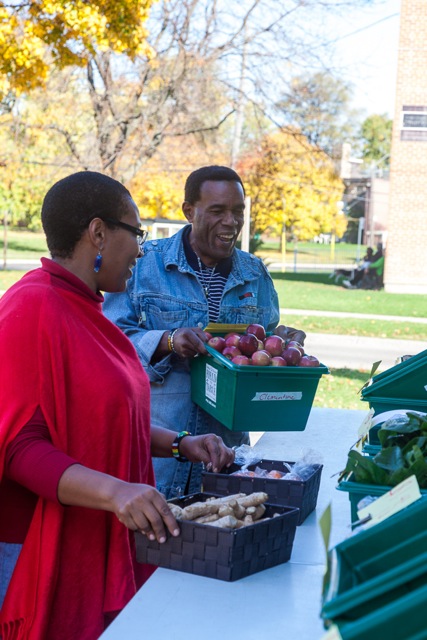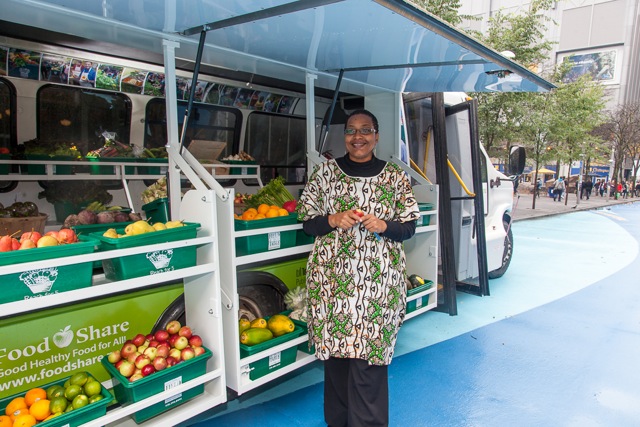Charity Spotlight: This post was provided by FoodShare Toronto, in collaboration with Afua Asantewaa, Coordinator of FoodShare Toronto’s Mobile Good Food Market, as part of our ongoing charity spotlight series.
There are many neighbourhoods in Toronto where healthy, fresh produce is costly, low-quality, and hard to find. If you don’t have access to a car, carrying groceries home in a buggy or by bus is very difficult, particularly in the winter for families with young children or people who experience limited mobility. For many people this means grabbing whatever is closest– whether it’s purchased at the local convenience store or nearest fast food restaurant.
At FoodShare we have had to get creative to ensure everyone in Toronto has access to healthy, affordable, fresh food. In partnership with Toronto Public Health Food Strategy, United Way Toronto, and the Food Policy Research Initiative, we launched the Mobile Good Food Market (MGFM) in 2012. It’s a market on wheels (built from a repurposed public transit bus) that travels to diverse neighbourhoods throughout the city selling high-quality, culturally appropriate, fresh vegetables and fruit – a service these neighbourhoods would otherwise lack access to.
“Before beginning this Job, I lived In Ghana,” said Afua Asantewaa, Coordinator of the Mobile Good Food Market. “I knew of poverty. But then when I came back to Canada I was hit with a level of poverty in the neighbourhoods where we operate that I did not expect to see here. I’ve heard people say, ‘I’ve taken vegetables and fruit out of my diet because it’s just too expensive,’ and I ask myself: Am l in Ghana or am I in Canada?”
How can we bring quality food to communities in need more cost-effectively?
We use our significant buying power that comes from FoodShare’s Good Food Programs to get the best deals on produce whenever we can. With FoodShare’s social enterprise model, customers pay the full cost of food and a portion of the transportation costs, while our salaries and infrastructure are funded through donations and grants.
Toronto has many cultures, and food helps build communities. At the mobile market, people from different cultures gather and conversations often revolve around questions such as, “What’s that? How do you cook that?” Neighbours get to know each other, and often say things like, “Oh, I never spoke to her before the market started.” Some people even come with their children, which is great for communicating how critical vegetables and fruit are to good health

Empowering communities
The success of our mobile market has shown that people will buy produce as long as it is fresh, affordable, culturally appropriate and available nearby. Since our launch, we’ve improved access to healthy, fresh food in Toronto neighbourhoods. In addition to the six locations we currently travel to each week, the results we’ve seen have allowed us to use the Mobile Market as a foothold for establishing sustainable and more affordable access to fresh produce in neighbourhoods for the long-term.
As of this year, we will operate in each neighbourhood for a period of one year. Then through local agency partnership along with community support, each Mobile Market will be converted to a Good Food Market, a permanent community fixture. This new initiative will not only give communities ownership of their markets, it will also allow us to expand the number of communities the Mobile Market assists.
It’s very exciting! The community is engaged, and working together we are taking the program to the next level.
A Successful and Sustainable Future
Permanent markets ensure the sustainability of the program while allowing us to expand. FoodShare started this initiative hoping it would be a success. We certainly didn’t know it would perform so well that people, both locally and in other cities, would be clamoring to have it in their neighbourhoods. Other organizations have even traveled from across the country to witness this project in action in an effort to try and replicate what we’re doing. With improved funding we know it will continue to foster positive behavioural change, particularly among communities that are identified as at higher risk for type 2 diabetes.
FoodShare Toronto is Canada’s original direct non-profit field to table Community Food Hub. Since 1985 FoodShare has modeled a food system that is sustainable and accessible for everyone, getting good healthy food and food education to schools and communities. Learn more about the organization, and all their Good Food Programs, by visiting their charity profile page>>>

Leave a Reply